iFi hip-dac 3
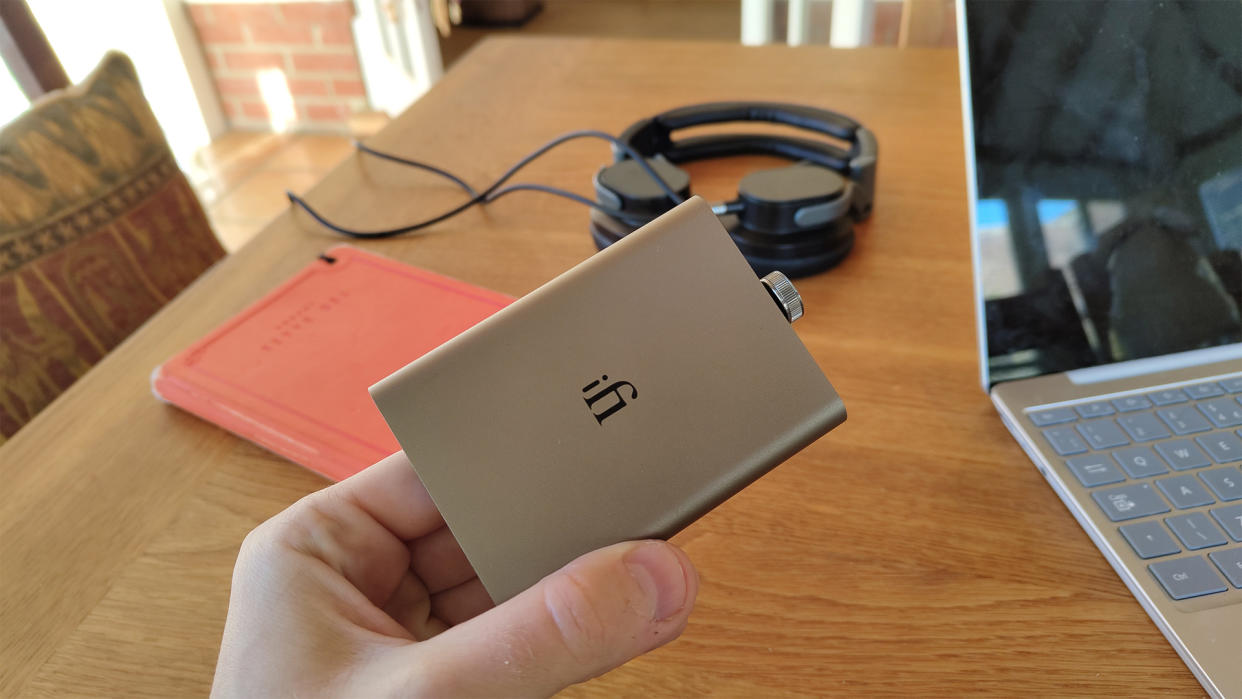
The third generation of iFi’s line of flask-shaped DACs has a lot to live up to. The original hip-dac earned our full five-star haul in 2019, winning us over with a classy, refined performance to match its equally tasteful exterior. Any doubts that 2021’s much-anticipated sequel couldn’t match this rather impressive marker were soon assuaged, as the hip-dac 2 bowled us over with its zealous, agile sound housed within an even slicker exterior.
This, then, leaves the iFi hip-dac 3 with a lot to live up to. The same flask-shaped body remains, albeit with a new “Titanium Shadow” grey finish, so you’ll once again have to suffer the occasional glance of a bemused commuter when you pull out what appears to be your own personal supply of whisky from your jacket pocket on the morning tube commute.
What matters, of course, is how the hip-dac 3 pushes the model line forward in terms of boosting your listening pleasure. There are a lot of portable DACs in the market at the moment designed to give your headphones a boost, including the Award-winning AudioQuest DragonFly Cobalt or even iFi’s tiny, five-star Go Link, meaning that looks alone certainly aren’t going to cut it this time around.
Time to find out, then, if the hip-dac 3 is a timeless vintage, or whether it just leaves you with a rather nasty hangover.
Price
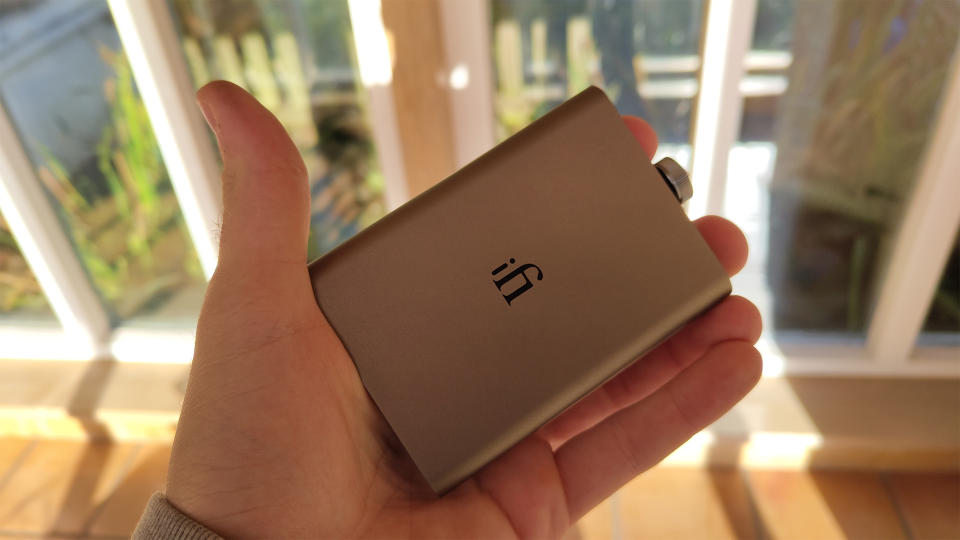
We thought the price of the previous hip-dac 2 (£189 / $189 /AU$279) to have been rather fine value, especially when you consider the fact that the sophomore effort replaced the original’s 8-core XMOS chip with a far more powerful 16-core version. The 2023 threepeat model costs £199 / $199 / AU$449, so prices have gone up a little, especially for the Australian market.
To put that into context, AudioQuest DragonFly Cobalt, a multiple What Hi-Fi? Awards 2023 winner, was originally tested at £259 / $300, although prices have dropped to around £200 / $200 at the time of writing. While not battery-powered, the DragonFly’s USB-stick form makes it a more portable design than the iFi model. Sticking with iFi, the Zen DAC V2 model is another repeat Award-winner, coming in slightly cheaper at £159 / $159 / AU$229.
Build & design
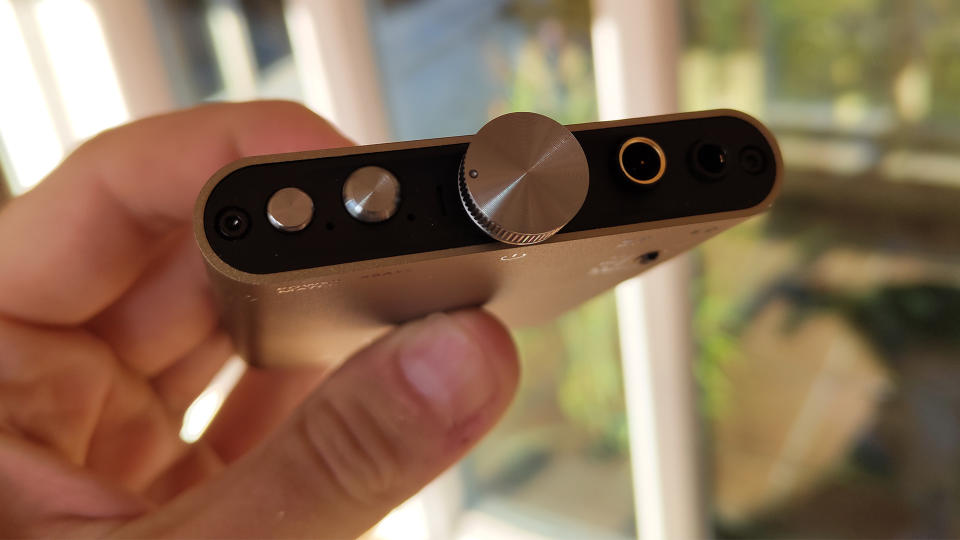
If you’re familiar with its predecessors, it won’t surprise you to learn that the hip-dac 3 is unquestionably a well-made unit. As with both the original and the second-gen model, that textured aluminium case has a reassuring solidity and weight to it, and while it may be a tad big for some (around the size of a pack of cards), it will fit into most palms and bags without much fuss. We’ve taken the hip-dac 3 on quite a few in-bag adventures to and from our offices, and it’s survived them all without so much as a nick or scratch across that fetching surface.
iFi hip-dac 3 tech specs
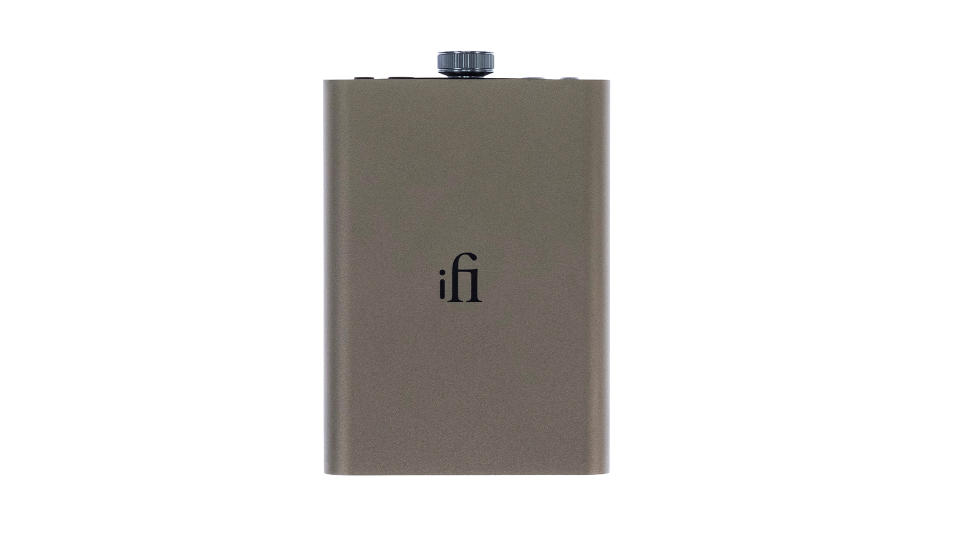
Input USB-C
Outputs N/A
Headphone output 3.5mm (single-ended), 4.4mm balanced
Bluetooth No
Max file support 32-bit/384kHz, DSD256, MQA
Battery-powered Yes (up to 12 hours of playtime)
Dimensions (hwd) 102 x 70 x 14mm
Weight 135g
The actual layout of the unit hasn’t really changed at all, in truth. Lay the DAC on its side facing towards you and you’ll notice that the ports and switches seem the same, with a silver rotational knob at the centre of the top panel flanked by headphone inputs as well as buttons for PowerMatch switchable gain alongside the Xbass boost feature. Next to the power knob are the two headphone jacks – one for 3.5mm and one for 4.4mm – and while it’s nice to have the latter, we wonder how many high-end 4.4mm headphone owners will buy a DAC at this price point.
Flip the unit over and check out the underside and you’ll find two USB-C ports – one for audio and one for charging – which replace the outgoing USB-A options provided by the second-gen model. That’s not an insignificant addition, as the inclusion of a USB-C “On The Go” Charging Cable means you can plug in the latest iPhone 15 if you’ve already nabbed one. That said, a USB-A to USB-C cable and a USB-C to Lightning cable are also provided for those who haven’t made the switch.
Features
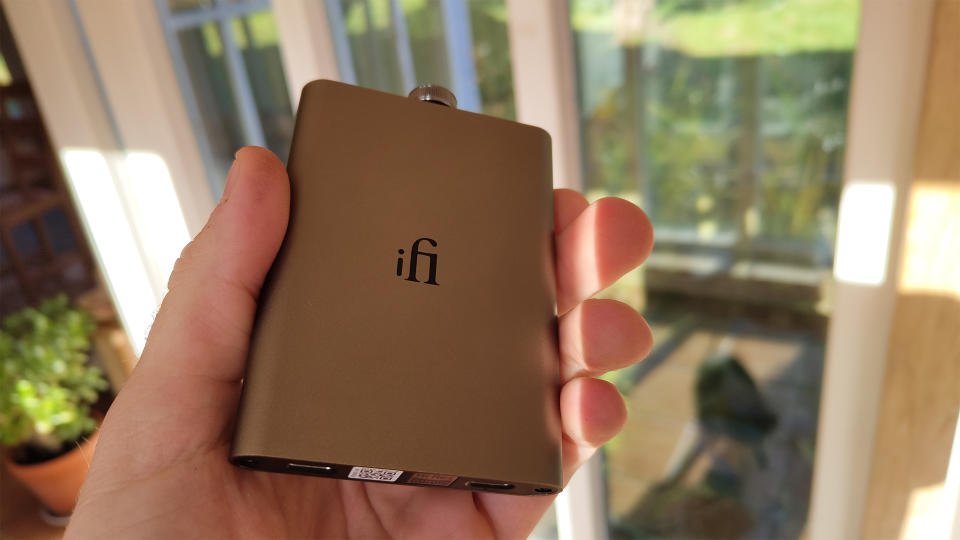
Many of the features which defined the hip-dac 2 return for the third iteration. Just as before, sound tailoring options are provided courtesy of both a PowerMatch button – which changes the internal amp’s gain for easier headphone matching – and XBass, back for a third time to whack up the low-end without muddying or blurring the sound entirely.
The hip-dac 3 uses a differential circuit design within its amplification stage to reduce signal distortion and preserve your audio's overall purity. That amp stage is capable of offering up to 400mW into a 32-ohm load for compatibility with a broader array of headphones, while the balanced output's 6.3V into 600 ohms should mean that even high-impedance models can be used without issue.
The hip-dac 3’s battery will, according to the manufacturer, extend to 12 hours of playing time, but this will very much depend on your listening volume level and how demanding your headphones are. The unit’s external LED will alter its colour depending on its levels of depletion: glowing white for more than 75 per cent battery, green for more than 25 per cent, red for over 10 per cent and flashing red when you’re almost out of juice.
File support is extensive, too. Hi-res PCM files are supported up to 32-bit/384kHz resolution, as are DSD64, 128 and 256, while full decoding of MQA is also available. On either side of the satisfyingly smooth-turning volume knob you’ll find a pair of LEDs that alter their colour to indicate the format and sample rate of audio being played, something that’s become commonplace not only for the hip-dac line but for most iFi models, including the recent Go Link and Go Blue models.
Sound
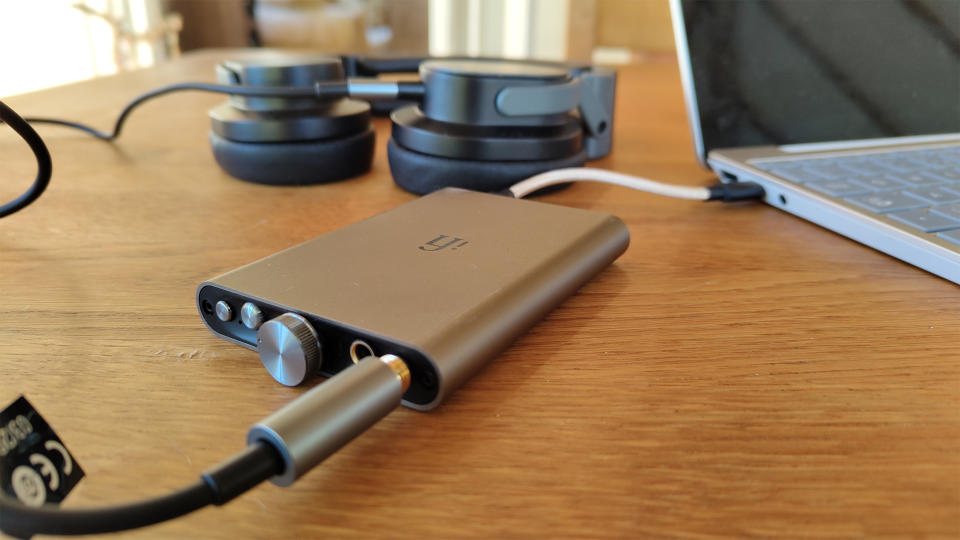
If you’re wondering where most of the real changes have been made from the hip-dac 2 to the hip-dac 3, this is the part to which you should be paying the most attention. iFi has promised to build on the legacy of both its preceding models by introducing a number of circuit enhancements, including new film capacitors for better frequency response and an updated version of iFi’s Global Master Timing circuitry to reduce phase noise and induce a snappier, crisper sound. That’s an exciting prospect.
With those aforementioned enhancements, an improved overall circuit design and more attuned sonic capabilities, this really could be the finest batch of hip-dac iFi has ever devised. We dive into our testing with Tidal Masters playing from a laptop and a pair of the excellent Austrian Audio Hi-X50 plugged into the hip-dac 3, and the resulting concoction is intoxicating.
The overall experience is thrilling, so much so that a Tidal recording of Tom Petty’s Won’t Back Down threatens to snap our ears off, such is the kick and pep the hip-dac 3 adds to proceedings. You’d need to be wearing boots of lead to stop your toes tapping along, and while the AudioQuest DragonFly Cobalt betters its rival for timing and rhythmic drive, the hip-dac 3 isn’t far off. That, as our glowing review of the Cobalt attests, is no mean feat.
There’s rarely a hint of harshness, either, and while the midrange just occasionally threatens to get a little lost among the various competing elements, the overall effect is invigorating without becoming tiresome. The hip-dac 3 seems to understand the Audio Hi-X50’s bright, enthusiastic tendencies, matching them while keeping proceedings balanced enough to smooth off any overwhelmingly rough edges. The result is an exciting, satisfying listen, and we’d recommend digging out Bj?rk’s Bachelorette, Jay-Z’s No Church In The Wild or Lana Del Rey’s Born To Die as prime pickings for the hip-dac 3 to gobble up.
The DAC is also terrific at unveiling the timbres of various instruments, adding appreciable gains to the level of textural insight you’ll receive from a worthwhile recording. Whether it’s the calming guitar strums of Fleet Foxes’ Wading Waist-High In Water, the finger snaps from Rick James’ Give It To Me Baby or the screeching strings of Muse’s You Make Me Feel Like It’s Halloween, everything is conveyed with more richness and expression when using the hip-dac. To return to Bachelorette, those sweeping strings are far richer and more dynamically involved when played through the iFi DAC (this time plugged into a pair of five-star R?de NTH-100), with appreciable peaks and troughs adding to the arrangement’s intense sense of drama and emotion.
Musical arrangements feel smartly curated, too. Part of this obviously owes to a decent pair of headphones (thanks R?de and Austrian Audio), but there’s an appreciable difference made when the hip-dac 3 is introduced regarding the presentation of voices and instruments when compared to simply plugging your headphones directly into your laptop. Musical elements ebb and flow more naturally within the overall sonic canvas, while harmonies are far richer and more distinctive with the iFi doing its thing. A punchy guitar twang in your left earcup during Led Zeppelin’s Whole Lotta Love, for instance, makes a bold, assertive entrance rather than becoming lost amid the general musical clamour.
Verdict
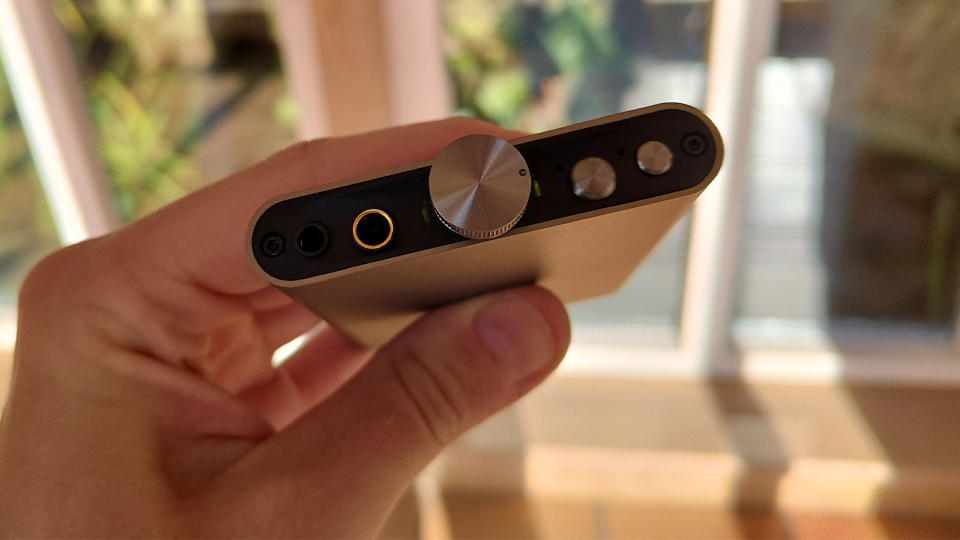
Considering the five-star markers set down by its predecessors, our expectations were certainly high for what could have proved to have been a tricky 'third album'.
Thankfully, this new generation hasn’t let us down. Smart, versatile and a pleasure to listen to, the third-gen iFi hip-dac 3 enhances your audio experience with a sonic profile that feels lively and energetic without ever becoming unrestrained or unwieldy. Like your favourite tipple, it really hits the spot.
SCORES
Sound 5
Build 5
Features 5
MORE:
Read our review of the AudioQuest DragonFly Cobalt
Also consider the AudioQuest DragonFly Red
Read our iFi Zen DAC V2 review
Best DACs: USB, desktop and portable digital-to-analogue converters
